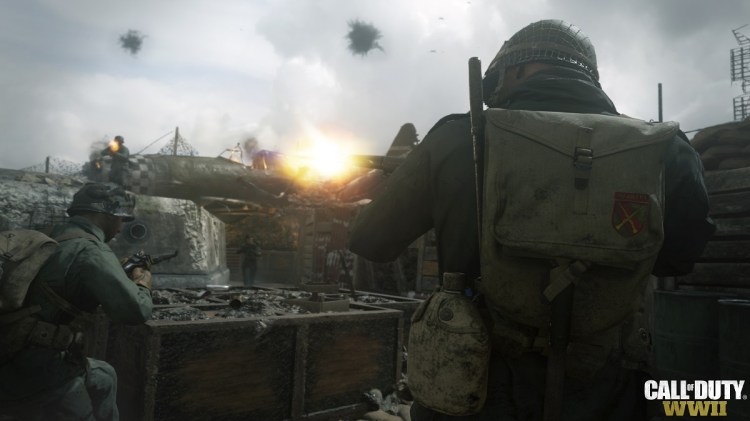Three years ago, Sledgehammer Games and Activision were deciding what to do about 2017’s Call of Duty game. They had veered off into science fiction for the billion-dollar-a-year first-person shooter franchise. But after hashing it over, they all agreed to take their “boots on the ground” video game back to its roots in World War II.
The result is Call of Duty: WWII, which debuts on November 3 on the PlayStation 4, Xbox One, Xbox One X, and the PC. And, alongside Destiny 2, the beta version of the multiplayer for Call of Duty: WWII has been playable this week at the Electronic Entertainment Expo (E3), the big game trade show this week in Los Angeles.
We talked with Eric Hirshberg, CEO of Activision, at the show, where Activision has a big booth again after a one-year absence last year. Hirshberg acknowledged that the franchise may have stayed with science fiction a year too long, as a lot of fans disliked the sci-fi Call of Duty: Infinite Warfare. This time around, after the WWII revelation, fans have had a much more positive reaction.
“We have incredible engagement,” Hirshberg said.
June 5th: The AI Audit in NYC
Join us next week in NYC to engage with top executive leaders, delving into strategies for auditing AI models to ensure fairness, optimal performance, and ethical compliance across diverse organizations. Secure your attendance for this exclusive invite-only event.
Destiny 2, a sequel to Bungie’s sci-fi shooter from 2011, launches on September 6. I talked with Hirshberg about the company’s launch strategy, among other things. Here’s an edited transcript of our interview.
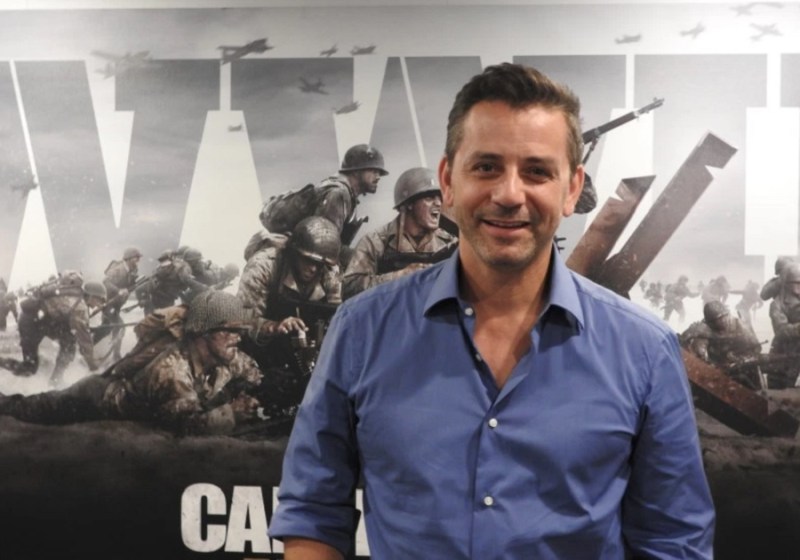
Above: Eric Hirshberg is CEO of Activision Publishing.
GamesBeat: I played Destiny 2 at the reveal but not here.
Eric Hirshberg: We’ve got some new content here. You can play the new sub-class today that you couldn’t at the reveal event. It’s a lot of fun.
GamesBeat: With WWII, can you talk about some of the backstory to going back to that setting?
Hirshberg: Almost three years ago now we sat down with Sledgehammer and talked about “what next?” As you know, at the time we had some games that were taking place in the future, both released and in development. That was new to the franchise. It was the right thing to do, and it opened up some innovations and freshness in gameplay that the franchise needed, but we felt like after that, we were trying our best to see three years in the future, and we thought it might be a good time to go back to our roots.
I remember saying, “I really want to play a WWII game made by Sledgehammer Games.” Sledgehammer has that cinematic storytelling gene, that impact in their creative approach that is really well-suited to the anguish and the humanity of the WWII setting. To their credit, they talked to the team, got excited about it, and got on board. We’re all over the opportunity. It’s been off to the races from there.
Everyone talks about “boots on the ground.” I think of it a little differently, in terms of a human scale. There’s a vulnerability to the way you feel when it’s just a man and a gun. That’s what taking Call of Duty back to its roots means to me, that sense of vulnerability. And I think it’s a great game. You’ll play it in a few minutes. In multiplayer we have a new mode, War mode, a collaborative team objective-based mode. We have the divisions approach in multiplayer, which is a unique way of creating your character and selecting your character. Make sure you see the single-player level, too.
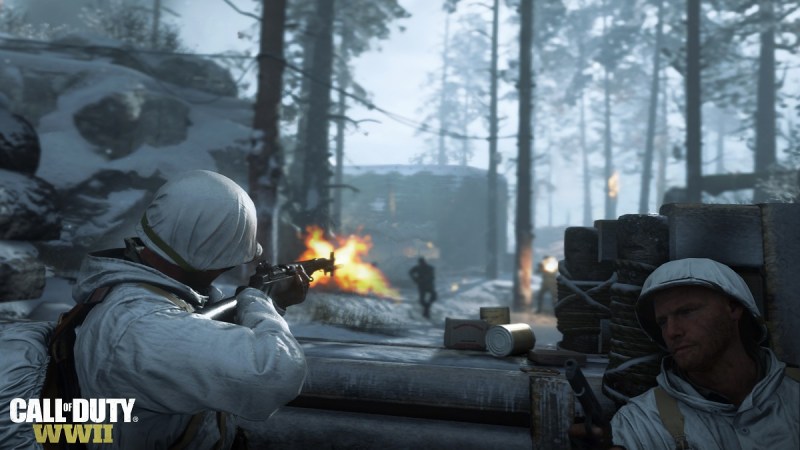 GamesBeat: It seems like the reactions to both Call of Duty and Destiny 2 have been pretty positive.
GamesBeat: It seems like the reactions to both Call of Duty and Destiny 2 have been pretty positive.
Hirshberg: Both got off to a great start when we revealed them a month or two ago. I think we’ve just increased our momentum this week with the assets we’ve put out. As great as the assets are doing on YouTube and social media, though, the response from people who’ve been hands-on in the booth has been the most encouraging to me.
GamesBeat: The hard thing here seems to be anticipating fan taste in any given year, because you’re doing that three years ahead of time. Sci-fi seemed to be a good direction at first. It was very well-received.
Hirshberg: It’s a challenge. What a difference a year makes, right? Black Ops II, Advanced Warfare, Black Ops III, these were all really well-received, high-performing games. Infinite Warfare was a really good, quality product. But it was clearly one future game too many when it came out.
GamesBeat: When it comes to anticipating what fans want in a WWII game, it seems like the technology has caught up to where you can do it justice in a different way.
Hirshberg: Certainly the level of graphic fidelity, the level of emotional connection you have with a human character in a game, the level of immersive, photorealistic environments — all of that has gotten exponentially better since the last time we were in the WWII setting. As a result, I think the impact and the feeling is incredible. It’s a game that not only plays great, but it feels great.
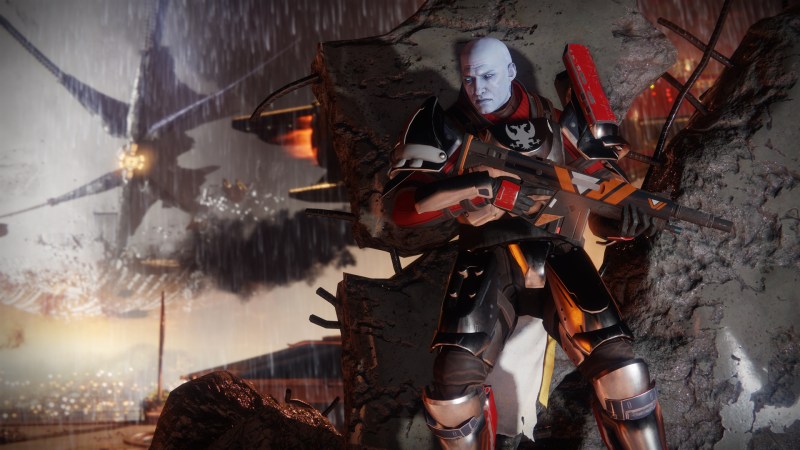
Above: Destiny 2
GamesBeat: Even within WWII games, players have expectations. You have to do the D-Day, Omaha Beach scene.
Hirshberg: If we didn’t do it, they’d say, “Where’s the D-Day scene?” When we do it, they say, “Oh, another D-Day scene.” The key to just do it great, whatever you do. But I thought the approach the team took from a narrative standpoint in the campaign was great. It’s all in the European theater. They’re all real-life environments. Some of them have been sort of under-covered in our pop culture examinations of WWII. Obviously there’s the big Christopher Nolan movie about Dunkirk coming now, but there’s a Dunkirk element to our game that was in it from the very beginning. Pointe du Hoc and Normandy, these are all authentically rendered and represented real locations from the war.
You can you feel the debris under your feet, the chill in the air, the sort of — the gravity of historical events. At the same time, we’re not making a documentary. We’re making a piece of entertainment. We’re trying to strike the right balance.
GamesBeat: With Xbox One X coming, does that add an extra challenge for this year?
Hirshberg: We haven’t had enough time with it to know whether or not it adds a challenge. That and the PS4 Pro certainly add an opportunity. They’re great additions to the hardware lineup. They give our teams new toys to play with.
GamesBeat: But it sounds like it’s not nearly as big as the year when Infinity Ward had to deal with 360 and Xbox One.
Hirshberg: That was totally different, because those were non-compatible ecosystems. When you’re jumping an entire generation, that’s different than an update, where everything is still compatible in the same ecosystem. That’s true for both PlayStation and Xbox.
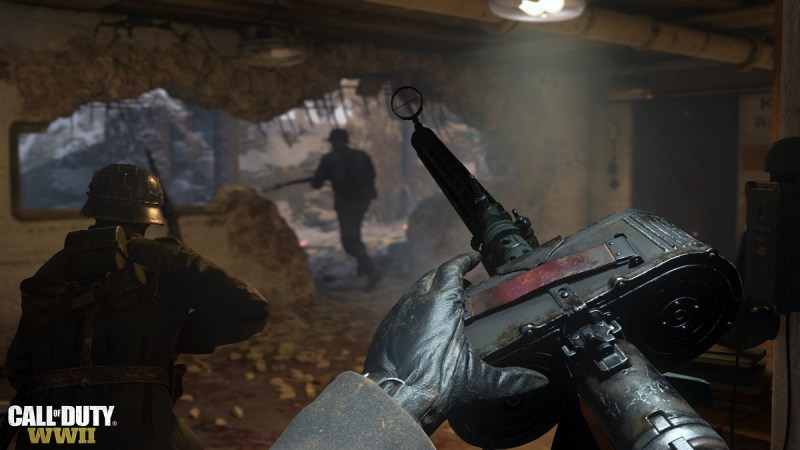
Above: Call of Duty: WWII
GamesBeat: As far as how to reveal some of these things, I wonder what the thinking has been like. Destiny 2 had its own event. Call of Duty came out relatively early. What’s turning out to be the best way to do these revelations?
Hirshberg: We didn’t even reveal Destiny 2 at the reveal event. We revealed it about a month earlier with our two cinematic assets with Cayde-6 and Zavala mapping out the storyline and the characters you’re going to get to play with. The thinking with Destiny 2 was — Destiny had so many towering strengths. It was so engaging, so fresh, so innovative, a new genre. But we’ll all freely admit that the story left something to be desired. We had some areas to improve there. We wanted to lead with a great narrative and great characters you’ll connect with on an emotional level. The strategy was to lead with, “Hey, I wanna hang out with those guys. I want to fight in that battle. I want to be a part of that world.”
Those two cinematic assets we put out about a month before the event were two of our most highly engaging assets we’ve ever created in Destiny’s history. Then, because we led with storytelling at that first beat, when we got to the event we had all of our gameplay powder dry. We just had a tremendous amount of content, an hour’s worth of content on stage, and hands-on content to show at the reveal.
With Call of Duty, we led with the campaign-based trailer. We talked about—it’s hard to predict three years in advance what’s going to be happening in culture and the community. But this was a year we clearly felt like it was our job to get out of the way of the game, let the game do the talking. We had the right game at the right time. It didn’t need a lot of explanation. We just dropped it on the world and they’ve been eating it up ever since.
The difference in approach on Call of Duty this week is we have playable multiplayer in the booth. We haven’t always had that. In fact, we’ve only had it once in our history, with Black Ops III. That turned out pretty well. The reason for that was, we feel like the cries a return to boots on the ground that we heard from our community—that’s a multiplayer-first sentiment. That’s about the way the game plays and feels in multiplayer. We felt like we were in a good place on the development. We were far enough ahead that we were ready to put a couple of maps and modes in people’s hands. Again, whenever you have the ability to just get out of the way of the content, that’s the best marketing we can possibly do.
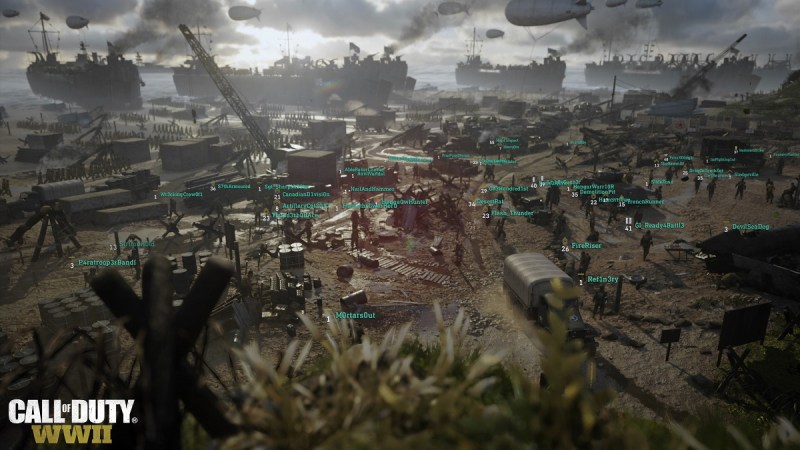
Above: Call of Duty: WWII
GamesBeat: I was a little confused by the trailer. You see the battlefield, and then you see shooting down airplanes. Are your boots really on the ground all the time?
Hirshberg: You’ve seen things like killstreaks and other elements inside multiplayer in the past. The one place where the vehicle plays a more personal role, if you will, in the game, is in War mode. War mode is a new mode for Call of Duty. It’s collaborative, objective-based, team-based, and a little bit narrative-based, which is really cool. When you’re seeing the tanks in the trailer, that’s part of War mode.
If you’re a fan of boots on the ground, that authentic Call of Duty feel, you’ll love the game. But also, if you’re in the mood for some fresh ideas, it has those for you too.
GamesBeat: For the sake of the fans, it’s good that there’s no Battlefield WWII game this year.
Hirshberg: No comment. [laughter]
GamesBeat: You don’t want to exhaust people on WWII too fast. They’ll be asking to go back to sci-fi again.
Hirshberg: That’s coming, if you wait long enough.
GamesBeat: Activision is back at E3. Was that an interesting decision?
Hirshberg: Each year we take it case by case and make the decision that’s right for that year. We felt like, because of all the things I just talked about — if you want to get tens of thousands of hands on the controllers to experience your games, this is a very efficient place for us to do that.
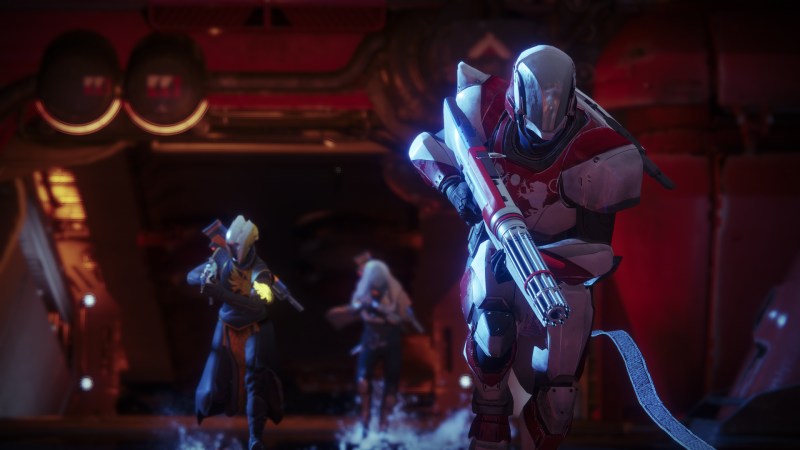
Above: Destiny 2
GamesBeat: Do you think a separate Call of Duty event made sense as long as there were no fans coming to E3?
Hirshberg: A Call of Duty-specific event might make sense in another year even if fans do continue coming to E3. We really do approach each year, from a marketing perspective, starting with the game we have and starting with the specific messages and things we want to get across, the specific things that are important to the fans at that moment. Last year, when we were launching the Call of Duty World League, a Call of Duty fan event that was timed with our finals for the first year of the league made a lot of sense. To be blunt, we weren’t as ready as we are on multiplayer a year ago. We needed a beat to get hands-on with multiplayer. For those reasons, Call of Duty XP made sense last year and E3 makes sense this year.
GamesBeat: From here on out, do you have more steady drumbeat planned?
Hirshberg: We have a great calendar. Our fans are going to hear more information from us on a steadier cadence than ever before. That’s as much about our approach to revealing the games as it’s a comment on culture. We live in a dialogue world. Our fans are a big part of our franchises. More information, more behind the scenes—we’re doing a Facebook Live series where we get up close and personal with some members of the teams making the games, showing how things come together. We have incredible engagement. People are really thirsty for more information.
You’ll see this throughout the year. We have some big beats coming up. We haven’t really revealed Zombies yet. We’ve talked about it and shown a couple of frames here and there. Also, other than the trailer, we haven’t done a deep dive on campaign yet. We have a lot more yet to come. And the beta, of course. Based on the hands-on response to the gameplay today, that obviously bodes well for the beta.
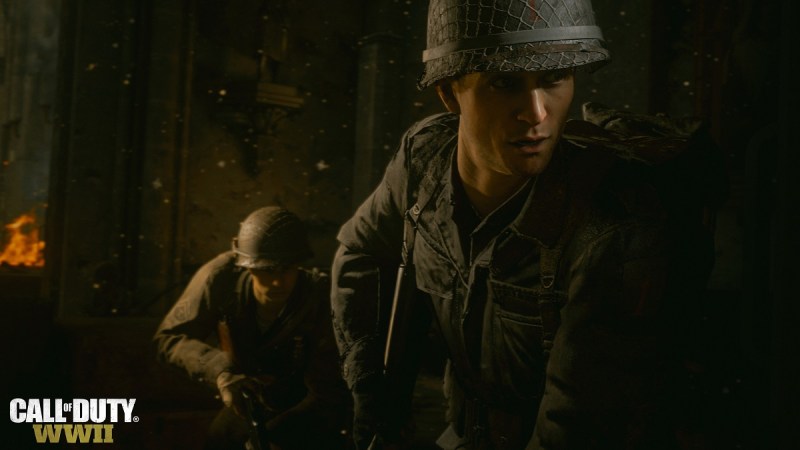
Above: Call of Duty: WWII
GamesBeat: It looks like these influencers are just getting stronger and stronger each year.
Hirshberg: That’s part of what I was talking about a minute ago. Again, it’s a dialogue world. These franchises become — they belong to our fans as much as they belong to us. When you spend hours every week immersed in a hobby and building social relationships and friendships around it, it’s no different whether it’s the NFL or the Premier League or whatever else people are really passionate about. Games are one of those things. Our fans invest a tremendous amount of passion and time.
Games are a unique art form in that our players are a part of the finished product. What they think and feel really matters to us.
GamesBeat: It seems like they help make it a year-round thing. They never leave Call of Duty.
Hirshberg: If we give them enough good stuff to play, maybe that happens. It all starts with the content.
